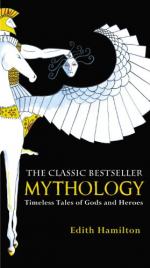
|
| Name: _________________________ | Period: ___________________ |
This test consists of 5 short answer questions, 10 short essay questions, and 1 (of 3) essay topics.
Short Answer Questions
1. To punish men, Zeus sent them ___________.
2. There are _______ different versions of the story of the creation of man.
3. Endymion was a shepherd who was loved by the Moon goddess __________.
4. Out of this came Night and Death, then Light, followed by Earth (_________) and Heaven (Ouranos, or Uranus).
5. ________________ was the goddess of marriage and women.
Short Essay Questions
1. How did Zeus become the king of the gods?
2. Overall, what were the initial roles of the Greek and Roman gods? How might this have been beneficial for mankind?
3. How were Homeric heroes different from earlier Greek heroes? What does this say about the Greeks at the time?
4. Choose one of the love stories in this section. Summarize this story. How does it reflect someone's jealousy?
5. How did Hercules purify himself? Do you see this as being necessary? Why or why not?
6. What do all of these stories reveal about the gods?
7. What lesson can be learned about the power of the gods from these stories? Is this lesson still relevant today? Why or why not?
8. Describe one of the Greek creation stories. How does this story compare to your own idea regarding the creation of the world?
9. Why were women seen as lesser beings? How does Greek mythology support this belief regarding women?
10. Why was Perseus famous? Does this make him a hero? Why or why not?
Essay Topics
Write an essay for ONE of the following topics:
Essay Topic 1
There are several myths about the royal House of Athens.
Part 1) Summarize these stories. What do these stories say about this house? How are these stories similar to those of the House of Atreus and the House of Thebes? What does this reinforce about the gods and their relationships with humans?
Part 2) How are these myths both good and bad? How is this house different from the Houses of Atreus and Thebes? Might these differences be seen today? How might this still affect Athenians today? Explain.
Part 3) What is another city or country in the world today that believes it is special because of its religious connections? How does this affect how its citizens act towards others? Do you see this religious pride as something that is good or bad? Why?
Essay Topic 2
The author states that Greek mythology should not be seen as a Bible of religious belief.
Part 1) What is meant by this statement? How should Greek mythology be viewed? Why should it not be understood as a Bible of religious belief? How might this affect one's belief in the Greek gods? How does this affect the power of these gods?
Part 2) How did this give freedom to various Greek writers and thinkers throughout history? How did these writers and thinkers influence Greek mythology? Why did they influence it in this way?
Part 3) Would a religion such as what is known as Greek mythology flourish today? Why or why not? What is necessary for a religion to be successful today? How does this reflect mankind today? What does it also reveal about the ancient Greeks?
Essay Topic 3
There are two families discussed in this book who suffer greatly.
Part 1) Who are these two families? How did they become so unlucky? Were they deserving of this bad luck? Why or why not? Could this luck have been avoided? If so, how? If not, why not? Could anyone in these families have stopped the passing along of bad luck? If so, how? If not, why not?
Part 2) What do these stories say about those who act poorly and offend the gods? What do these stories also say about the gods themselves? In our own culture, do we believe that bad luck can be passed down through a family? Why or why not?
Part 3) Do you believe in luck? Why or why not? How did you come to have this belief? How does this belief influence your daily decisions and actions? Might your belief regarding luck ever change? If so, how? If not, why not?
|
This section contains 1,739 words (approx. 6 pages at 300 words per page) |

|




